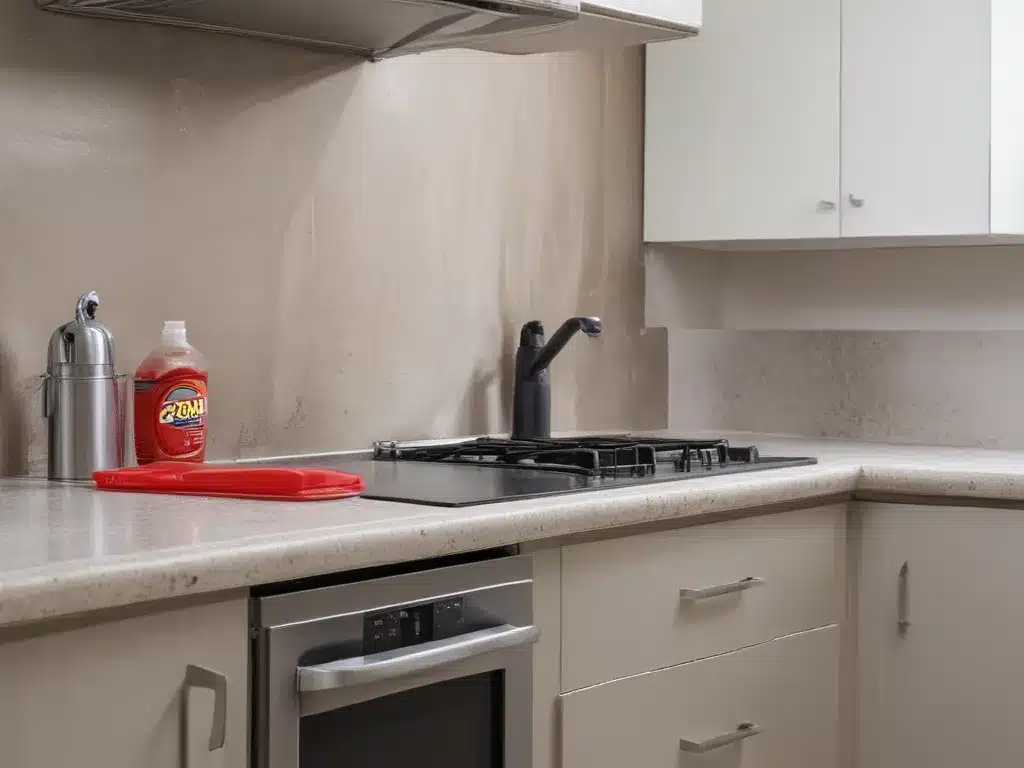Introduction
Kitchens are the heart of every home, where delicious meals are prepared and memories are made. However, with all the cooking and food preparation, it’s inevitable that grease and grime will accumulate on surfaces, appliances, and in hard-to-reach areas. This buildup can not only make your kitchen look unsightly, but it can also harbor bacteria and pose health risks if not addressed promptly. In this article, I’ll share my tried-and-true techniques for tackling even the toughest grease and grime, leaving your kitchen sparkling clean and hygienic.
Identifying Common Culprits
To effectively combat grease and grime, it’s essential to identify the main culprits in your kitchen. The stovetop, oven, and range hood are often the primary offenders, as they’re exposed to splattering oils and cooking vapors. The kitchen cabinets, especially those near the stove, can also accumulate a significant amount of grease buildup over time. Additionally, the backsplash, countertops, and even the walls around the cooking area can become stained and grimy from splatters and cooking residue.
Powerful Natural Solutions
When it comes to cleaning grease and grime, I prefer to use natural solutions whenever possible. Not only are they environmentally friendly, but they can also be surprisingly effective and often safer for household use. Here are some of my go-to recipes:
Baking Soda and Vinegar Paste
Baking soda and vinegar are two powerhouse ingredients that work wonders together. To create a potent cleaning paste, I combine equal parts of baking soda and white vinegar in a bowl until it forms a thick, spreadable consistency. This paste can be applied to stubborn grease stains, let sit for a few minutes, and then scrubbed away with a non-abrasive sponge or brush. The baking soda acts as a gentle abrasive, while the vinegar helps to cut through the grease and grime.
Lemon Juice and Salt Scrub
Lemons are a natural source of citric acid, which makes them excellent for cutting through grease and leaving a fresh, clean scent. To create an effective scrub, I mix lemon juice with coarse salt (or baking soda for extra abrasion). This mixture can be applied to greasy surfaces, allowed to sit for a few minutes, and then scrubbed vigorously with a sponge or brush.
Castile Soap and Essential Oils
For a gentle yet effective cleaning solution, I often turn to a combination of castile soap and essential oils. Castile soap is a plant-based, biodegradable cleaner that can effectively cut through grease and grime without harsh chemicals. I add a few drops of essential oils like lemon, orange, or tea tree to enhance the cleaning power and leave a pleasant, natural scent.
Tackling Tough Areas
While the natural solutions mentioned above can work wonders on most surfaces, some areas in the kitchen may require a more targeted approach. Here are some specific tips for tackling those stubborn spots:
Stovetop and Oven
The stovetop and oven are notorious for accumulating baked-on grease and food debris. For these areas, I like to use a combination of baking soda and vinegar paste, letting it sit for a while to soften the grime before scrubbing. For particularly stubborn stains, I may also need to use a specialized oven cleaner or a non-abrasive scrub pad.
Range Hood and Exhaust Fan
The range hood and exhaust fan can accumulate a significant amount of grease and grime over time, which can be a fire hazard if not cleaned regularly. To tackle these areas, I start by removing any removable filters or components and soaking them in a degreasing solution (like hot water and dish soap). For the hood itself, I use a heavy-duty degreaser or a mixture of baking soda and water, applying it with a brush or sponge and letting it sit before wiping away.
Cabinets and Backsplash
Grease can easily accumulate on kitchen cabinets, especially those near the stove, and on the backsplash area. For these surfaces, I typically use a gentle cleaner like castile soap or a diluted vinegar solution, applying it with a soft cloth or sponge and wiping away any residue.
Maintenance and Prevention
While deep cleaning your kitchen to remove grease and grime is crucial, it’s equally important to maintain a regular cleaning routine to prevent buildup. Here are some tips for keeping your kitchen looking its best:
Daily Cleaning
Perform a quick daily wipe-down of high-traffic areas like the stovetop, countertops, and sink after cooking or meal preparation. This simple habit can go a long way in preventing grease and grime from accumulating and becoming harder to remove.
Weekly Deep Cleaning
Set aside time once a week for a more thorough cleaning of your kitchen. This should include wiping down cabinets, appliances, and other surfaces that may not get attention during daily cleanings.
Use Proper Ventilation
Proper ventilation is key to preventing excess grease and cooking vapors from settling on surfaces throughout your kitchen. Always use your range hood or exhaust fan while cooking, and consider opening windows or using a fan to improve air circulation.
Cover Pots and Pans
Whenever possible, use lids or covers when cooking to minimize splattering and the release of grease and cooking vapors into the air.
Addressing Biohazard Situations
In some cases, grease and grime buildup can escalate into a biohazard situation, posing significant health risks. If you encounter a situation involving bodily fluids, sewage, or other biohazardous materials, it’s crucial to seek professional assistance. Companies like Adam Cleaning offer specialized biohazard cleaning services, ensuring that the area is properly disinfected and safe for occupancy.
Conclusion
Keeping your kitchen free from grease and grime is essential for maintaining a clean, healthy, and visually appealing cooking space. By incorporating natural cleaning solutions, targeted techniques for tough areas, and regular maintenance routines, you can effectively tackle even the most stubborn buildup. Remember, prevention is key, so be diligent about daily cleaning and proper ventilation to minimize future accumulation. With these tips and strategies, you’ll be able to enjoy a spotless kitchen that’s a joy to cook in.







